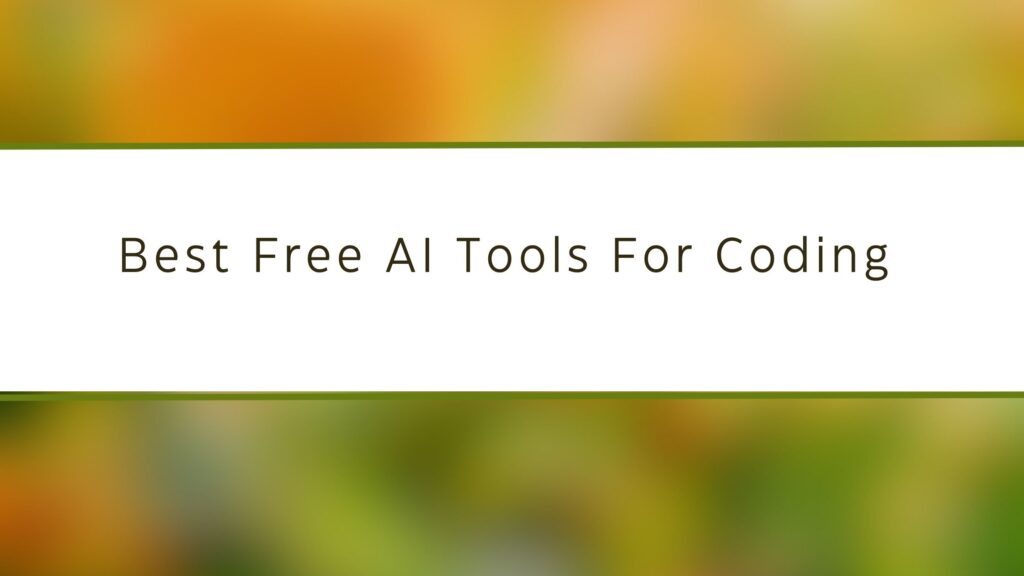Do you want to know the Best Free AI Tools For Coding?… If yes, this blog is for you. In this blog, I will share 17 of the best free AI tools for coding, explaining what they offer, how they help, and when you should use them.
Now, without further ado, let’s get started-
Best Free AI Tools For Coding
- What to Consider When Choosing AI Coding Tools
- 1. GitHub Copilot
- 2. Tabnine
- 3. OpenAI Codex
- 4. CodeT5
- 5. IntelliCode by Microsoft
- 6. DeepCode
- 7. CodeWhisperer by AWS
- 8. Ponicode
- 9. Sourcery
- 10. PyCharm Code Completion
- 11. Polycoder
- 12. Replit Ghostwriter
- 13. Codiga
- 14. Kaggle Kernels
- 15. AutoHotKey (AHK)
- 16. ChatGPT for Code Assistance
- 17. Codeium
- Comparison of Best Free AI Tools For Coding
- How to Integrate AI Tools into Your Workflow
- Future of AI in Coding
- Conclusion
What to Consider When Choosing AI Coding Tools
Before choosing an AI coding tool, think about what features you need. These are the important parameters to consider:
- Code Assistance: Does the tool suggest lines or blocks of code, and does it make writing code easier?
- Language Support: Make sure the tool works with the programming languages you use.
- Bug Detection: Does it help you find and fix bugs in your code?
- Integration: Can it work with the coding environment or tools you’re already using (like Visual Studio Code)?
- Ease of Use: Some tools are easier to learn than others, so choose one that matches your skill level.
Now, let’s see the Best Free AI Tools For Coding–
1. GitHub Copilot
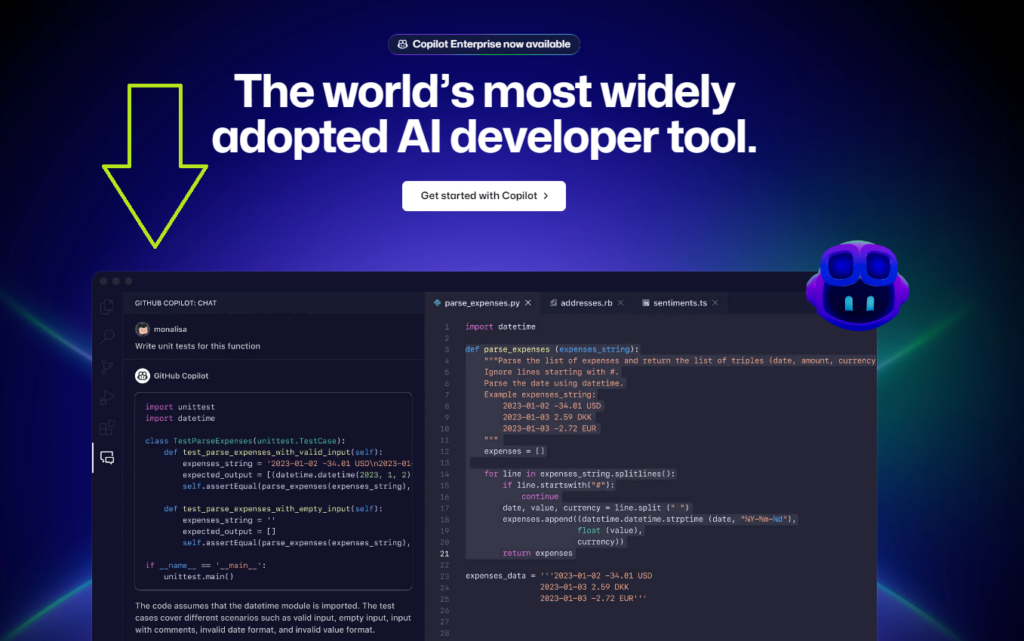
GitHub Copilot, made by GitHub and powered by OpenAI’s Codex, is a tool that helps you write code faster. It suggests code based on what you’re typing and helps with repetitive tasks.
- Main Features:
- Suggests code as you write.
- Understands the context of your code and gives relevant suggestions.
- Learns from millions of GitHub repositories to offer the best suggestions.
- Supported Languages: Python, JavaScript, TypeScript, Ruby, Go, Java, PHP, and many more.
- Advantages:
- Fast coding: It helps you write code faster by suggesting code lines and functions.
- Learning support: Beginners can learn best coding practices through the suggestions.
- Personalized suggestions: It learns your coding style over time and gives more accurate suggestions.
- Drawbacks:
- Accuracy issues: Sometimes, the suggestions may be wrong or unrelated to what you need.
- Context dependency: It works best when your code has enough context like variable names and function definitions.
- Best For: Developers who want real-time code suggestions for multiple programming languages.
2. Tabnine
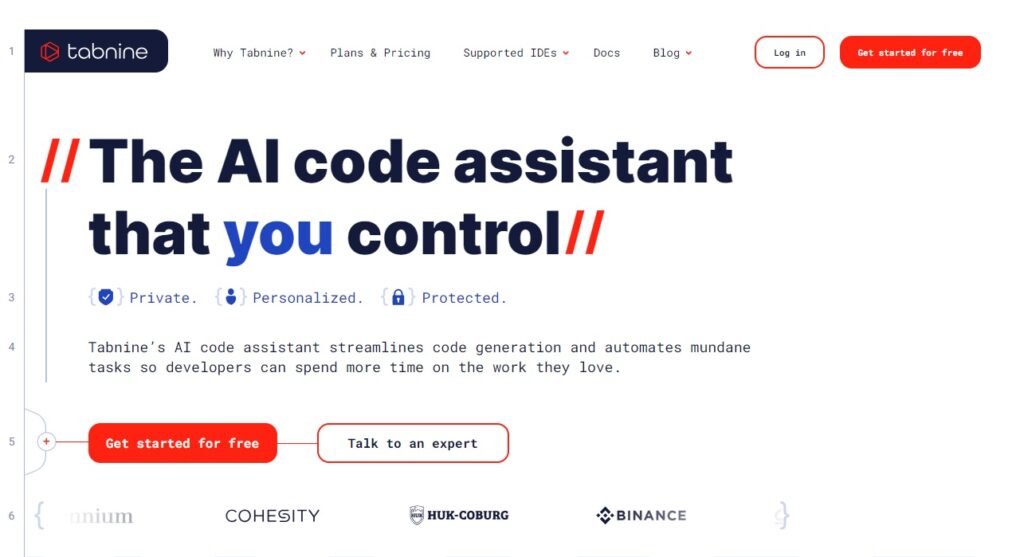
Tabnine is another AI-powered tool that helps developers by suggesting smart, context-based code completions. It learns from public code to give helpful suggestions in many programming languages.
- Main Features:
- Autocompletes functions, methods, and variables.
- Supports private model training to adapt to your specific projects.
- Works with popular code editors like VS Code, IntelliJ, and PyCharm.
- Supported Languages: JavaScript, Python, Java, C++, PHP, TypeScript, Rust, Go, and more.
- Advantages:
- Saves time: It speeds up coding by offering suggestions for multiple languages.
- Customizable: You can train it on your own code to get personalized suggestions.
- Instant feedback: It suggests code in real-time as you type.
- Drawbacks:
- Irrelevant suggestions: It can sometimes suggest code that doesn’t fit the context.
- Free version limitations: Some advanced features are only available in the paid version.
- Best For: Developers who want AI-driven code completion in various languages in their favorite code editor.
3. OpenAI Codex
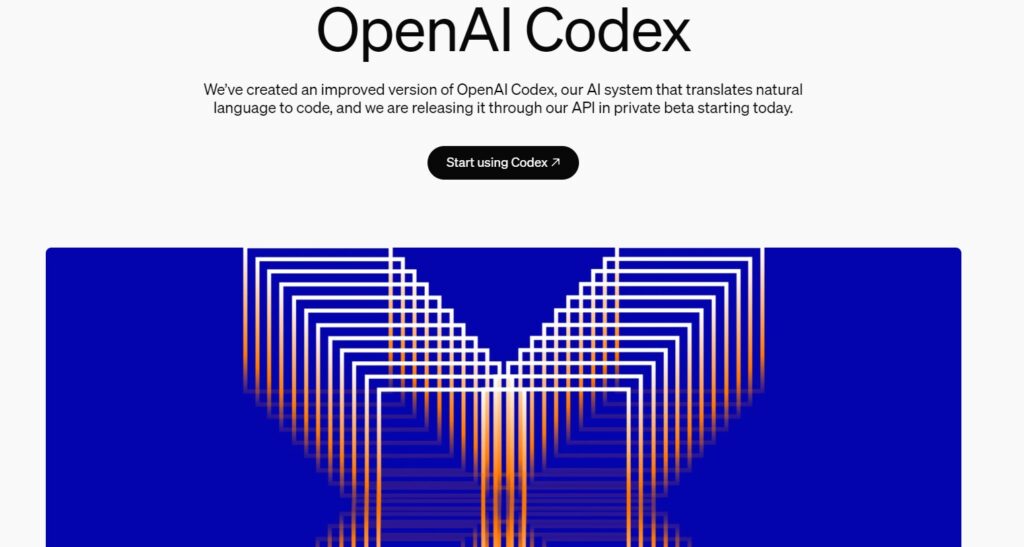
OpenAI Codex is one of the most advanced AI tools for coding. It can turn plain English instructions into code, making it very useful for developers who need help writing scripts or complex functions.
- Main Features:
- Translates natural language (like English) into code.
- Lets you ask questions and get code suggestions in response.
- Can generate code for a wide range of programming languages.
- Supported Languages: JavaScript, Python, Ruby, Go, Perl, and more.
- Advantages:
- Easy to use: You can describe what you want in plain language, and Codex will generate the code for you.
- Works with many languages: It supports multiple programming languages and frameworks.
- Interactive: You can refine the code suggestions by asking follow-up questions.
- Drawbacks:
- Longer code: Sometimes it generates code that’s more complex or lengthy than needed.
- Needs oversight: You’ll still need to check the generated code to ensure it’s correct and efficient.
- Best For: Developers who want help turning plain instructions into working code for more complex tasks or scripts.
4. CodeT5
CodeT5 is a powerful tool developed by Salesforce Research. It can help with summarizing, generating, translating, and completing code. It’s open-source, so developers can customize it for their own projects.
- Main Features:
- Summarizes code: Creates summaries of code to help with documentation.
- Generates code: Can produce new code snippets based on the given context.
- Translates code: Converts code from one programming language to another.
- Supported Languages: Python, Java, JavaScript, C, C++, and more.
- Advantages:
- Multi-purpose: It helps with several tasks, like generating and translating code or summarizing existing code.
- Customizable: Since it’s open-source, you can fine-tune it to suit your projects.
- Documentation aid: Its code summarization feature makes writing documentation easier.
- Drawbacks:
- Complex setup: It requires some setup and technical knowledge to get it running.
- Heavy on system resources: Like most AI models, it can slow down your computer, especially on larger projects.
- Best For: Developers who want a versatile AI tool for generating, summarizing, and translating code between different languages.
5. IntelliCode by Microsoft

IntelliCode is a free AI tool built by Microsoft that helps developers write better code faster. It’s integrated into Visual Studio and Visual Studio Code, offering smart suggestions for code completion and best practices.
- Main Features:
- Suggests code snippets and solutions based on your code’s context.
- Learns from your project and adapts its suggestions to match your coding style.
- Supports several popular programming languages.
- Supported Languages: C#, C++, Python, JavaScript, TypeScript, XAML, and more.
- Advantages:
- Tailored suggestions: IntelliCode learns from your codebase and provides suggestions that fit your specific needs.
- Code quality improvement: Helps you write cleaner, more efficient code by suggesting best practices.
- Integrated: Works directly within Visual Studio and VS Code, so you don’t need to install extra software.
- Drawbacks:
- Only works in Visual Studio: If you use another code editor, you won’t be able to use IntelliCode.
- Best For: Developers who use Visual Studio or VS Code and want a tool that provides smart code suggestions based on best practices.
6. DeepCode
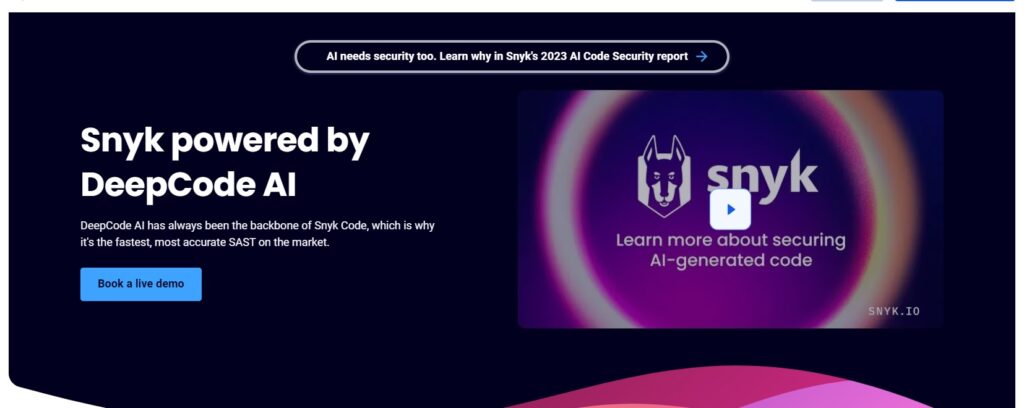
DeepCode is an AI-powered code review tool that helps you spot bugs, vulnerabilities, and improvements in your code. It uses machine learning to understand code and give recommendations on how to fix it.
- Main Features:
- Detects potential bugs and suggests improvements.
- Offers recommendations for making your code more secure.
- Works with GitHub, Bitbucket, GitLab, and other repositories.
- Supported Languages: Java, JavaScript, TypeScript, Python, C++, and more.
- Advantages:
- Bug detection: It helps you find bugs early in the development process.
- Security focus: DeepCode identifies security risks in your code and provides recommendations to fix them.
- Integration with repositories: It easily integrates with GitHub and other repositories, allowing you to review code directly within your workflow.
- Drawbacks:
- Limited language support: While it covers many popular languages, it might not support niche programming languages.
- Resource-heavy: May slow down larger projects with multiple files.
- Best For: Developers who need AI-assisted code review to catch bugs and vulnerabilities early in the development process.
7. CodeWhisperer by AWS
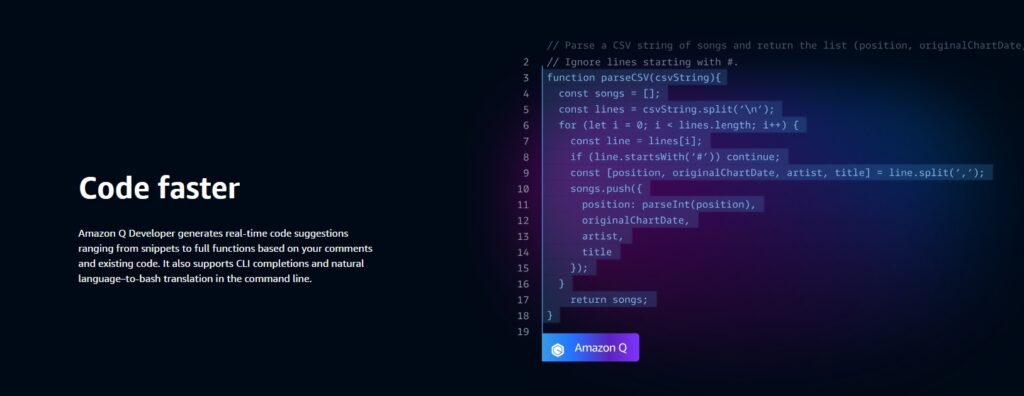
CodeWhisperer by Amazon Web Services (AWS) is an AI-powered code suggestion tool designed to help developers write code faster. It works within IDEs and provides suggestions that align with AWS best practices.
- Main Features:
- Provides code completions, recommendations, and AWS-specific suggestions.
- Supports code security by flagging potential issues.
- Learns from your code to offer more accurate and relevant suggestions.
- Supported Languages: Python, JavaScript, Java, and others.
- Advantages:
- AWS-friendly: It integrates well with AWS services, making it ideal for developers working on cloud-based projects.
- Security-focused: It flags insecure code, helping you write safer applications.
- Efficiency: CodeWhisperer reduces the time spent writing repetitive code by offering smart completions.
- Drawbacks:
- Limited to AWS ecosystem: It’s more useful for developers working in the AWS ecosystem and might not offer the same benefits for other environments.
- Lesser language variety: It doesn’t support as many languages as some other tools.
- Best For: Developers building applications on AWS who want to speed up coding and follow best practices for cloud computing.
8. Ponicode
Ponicode helps developers write unit tests and improve code quality through AI-based assistance. It automates parts of the testing process and makes it easier for developers to ensure their code is reliable.
- Main Features:
- Helps write unit tests automatically.
- Offers recommendations for improving code quality.
- Integrates with popular IDEs like VS Code.
- Supported Languages: JavaScript, TypeScript, Python, Java, and more.
- Advantages:
- Automated unit tests: Ponicode saves time by generating unit tests, ensuring that your code is reliable and works as expected.
- Code quality improvement: It helps you maintain clean, readable code by offering suggestions for improvements.
- IDE integration: Ponicode integrates with your favorite code editors, making it easy to use within your workflow.
- Drawbacks:
- Limited scope: While it’s great for testing, it doesn’t help much with other aspects of coding like bug fixing or refactoring.
- Free version limitations: Advanced features are available only in the paid version.
- Best For: Developers who want to automate the process of writing unit tests and improve the overall quality of their code.
9. Sourcery
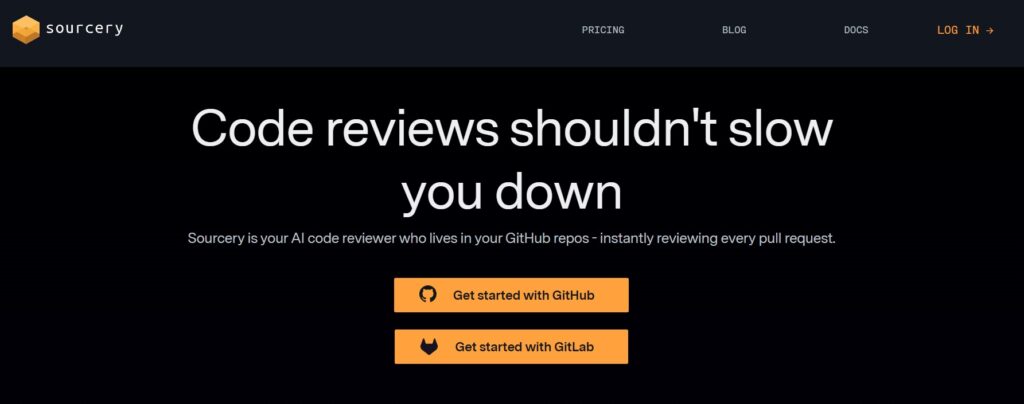
Sourcery is an AI tool designed to help developers improve their code quality through automated suggestions. It analyzes your code and recommends refactoring options to make it cleaner and more efficient.
- Main Features:
- Refactors code to improve readability and efficiency.
- Offers real-time suggestions as you code.
- Integrates with popular IDEs like VS Code, PyCharm, and Sublime Text.
- Supported Languages: Python (support for other languages in progress).
- Advantages:
- Improves code quality: Sourcery helps you write cleaner, more efficient code by suggesting improvements.
- Real-time feedback: It offers suggestions as you write code, helping you make changes immediately.
- Easy integration: It works with many popular code editors, making it a seamless part of your workflow.
- Drawbacks:
- Python-focused: Currently, Sourcery only supports Python, though support for more languages is being developed.
- Refactoring limitations: It focuses mainly on code refactoring and might not help much with other coding challenges.
- Best For: Python developers who want to improve their code quality with real-time AI-driven suggestions.
10. PyCharm Code Completion
PyCharm is a powerful IDE for Python developers, and its AI-driven code completion feature makes coding faster and easier. It understands the context of your code and offers intelligent suggestions to complete code snippets and functions.
- Main Features:
- Offers smart code completion based on the context.
- Suggests whole code blocks and fixes syntax errors.
- Integrates with a wide range of Python libraries and frameworks.
- Supported Languages: Primarily Python, with support for JavaScript, SQL, HTML, and more.
- Advantages:
- Smart code completion: PyCharm provides accurate suggestions based on your current code, making it easier to complete complex code blocks.
- Error detection: It helps identify syntax errors and provides quick fixes.
- Python-friendly: PyCharm is tailored to Python developers, making it a highly efficient tool for working with Python codebases.
- Drawbacks:
- PyCharm-specific: The AI code completion feature is only available in PyCharm, which might not be ideal if you prefer a different IDE.
- Heavyweight: PyCharm is a resource-intensive IDE, and its AI features can slow down on larger projects.
- Best For: Python developers who use PyCharm and want smart code suggestions and real-time error detection.
11. Polycoder
Polycoder is an AI tool designed to help developers write code more efficiently by offering advanced code completion, summarization, and bug detection features. It’s based on the GPT-3 model, known for its natural language understanding capabilities.
- Main Features:
- Suggests code completions and corrections based on your input.
- Summarizes code blocks to make them easier to understand.
- Identifies and fixes potential bugs in real-time.
- Supported Languages: Python, JavaScript, Ruby, Go, and more.
- Advantages:
- Context-aware: Polycoder understands the context of your code and offers relevant suggestions, improving your coding speed and accuracy.
- Error detection: It helps identify and correct bugs as you write code.
- Summarization: The ability to summarize code blocks makes it easier to understand complex functions or modules.
- Drawbacks:
- Resource-heavy: Since it’s based on GPT-3, Polycoder can be slow on larger projects or with less powerful machines.
- Learning curve: Some features might require time to learn and use effectively.
- Best For: Developers who want a tool that offers both code completion and summarization, especially when working on complex projects.
12. Replit Ghostwriter
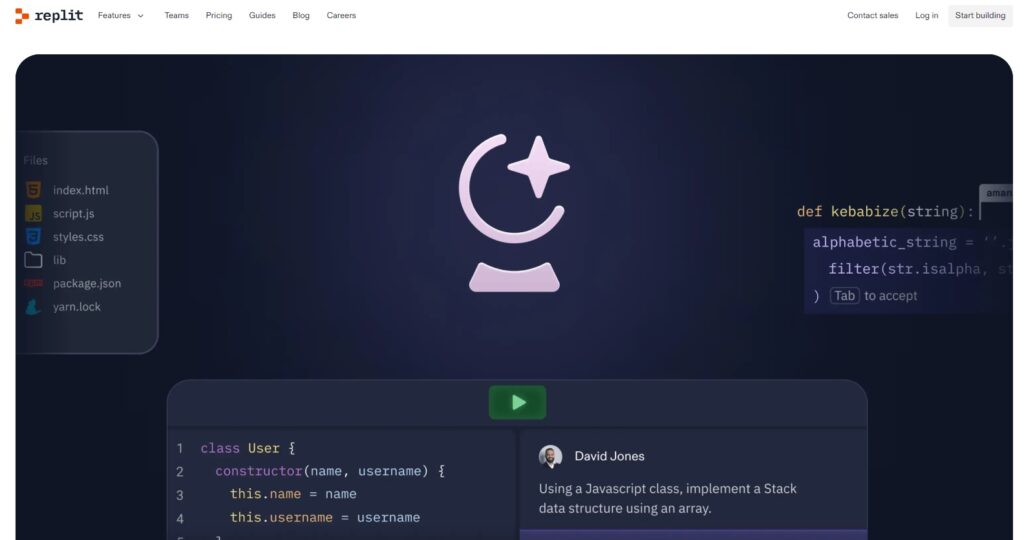
Replit Ghostwriter is an AI-powered tool that helps you write code quickly and easily. It works within the Replit environment, an online platform that lets developers write, test, and deploy code directly in their browser.
- Main Features:
- Provides real-time code completions and suggestions.
- Helps you debug and fix errors in your code.
- Works in the cloud, so there’s no need to install anything locally.
- Supported Languages: Python, JavaScript, HTML/CSS, and more.
- Advantages:
- Web-based: Replit Ghostwriter works in the cloud, so you can write code from anywhere without needing to install software.
- Fast suggestions: It offers quick code completions based on the context of your project.
- Debugging assistance: Ghostwriter helps you find and fix errors, improving your code quality.
- Drawbacks:
- Limited language support: While it supports popular languages, Replit Ghostwriter may not work with more niche or specialized languages.
- Online-only: Since it’s a web-based tool, you’ll need an internet connection to use it.
- Best For: Developers who want a cloud-based AI tool to write and debug code, especially those who prefer working in a browser environment.
13. Codiga
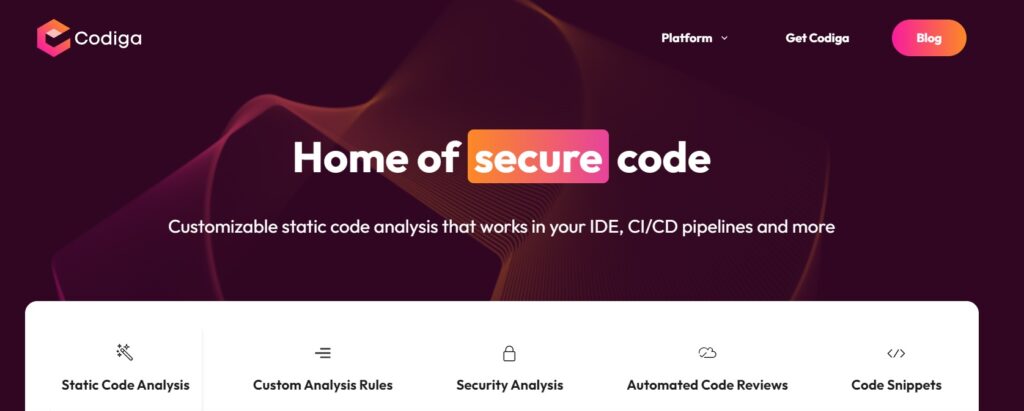
Codiga is an AI-driven code analysis tool that helps developers improve their code quality by providing real-time feedback on best practices, security issues, and code efficiency.
- Main Features:
- Analyzes code in real-time for errors, security vulnerabilities, and best practices.
- Integrates with multiple IDEs like VS Code, IntelliJ, and JetBrains.
- Supports both individual and team coding environments, making it suitable for collaboration.
- Supported Languages: Java, Python, JavaScript, TypeScript, and more.
- Advantages:
- Real-time code analysis: Codiga gives immediate feedback, allowing you to fix issues as you code.
- Collaboration-friendly: It works well in team environments, ensuring everyone adheres to coding standards.
- IDE integration: You can use it directly within popular IDEs without disrupting your workflow.
- Drawbacks:
- Advanced features locked behind paywall: Some of the more useful features, such as team collaboration tools, require a paid subscription.
- Limited to supported languages: Codiga might not support less commonly used programming languages.
- Best For: Developers and teams who want to maintain high-quality code through real-time analysis and collaboration tools.
14. Kaggle Kernels
Kaggle Kernels is an online coding platform that leverages AI to help data scientists and developers write and execute code. It’s a cloud-based environment, so there’s no need to install anything locally.
- Main Features:
- Provides a free cloud environment for coding in Python and R.
- Offers pre-built machine learning models and datasets to experiment with.
- Integrates with various AI tools for coding and data analysis.
- Supported Languages: Python, R.
- Advantages:
- Cloud-based: You can write and execute code in the cloud without needing to install software.
- Access to pre-built models: Kaggle Kernels offers pre-built models and datasets, making it easier to learn and experiment with machine learning techniques.
- Community-driven: Kaggle has an active community where you can share your code, learn from others, and get feedback.
- Drawbacks:
- Limited languages: Kaggle Kernels supports only Python and R, so it’s not useful for other languages.
- Requires internet connection: Since it’s a cloud-based platform, you’ll need to be online to use it.
- Best For: Data scientists and developers who want a cloud-based environment for coding and experimenting with AI tools.
15. AutoHotKey (AHK)
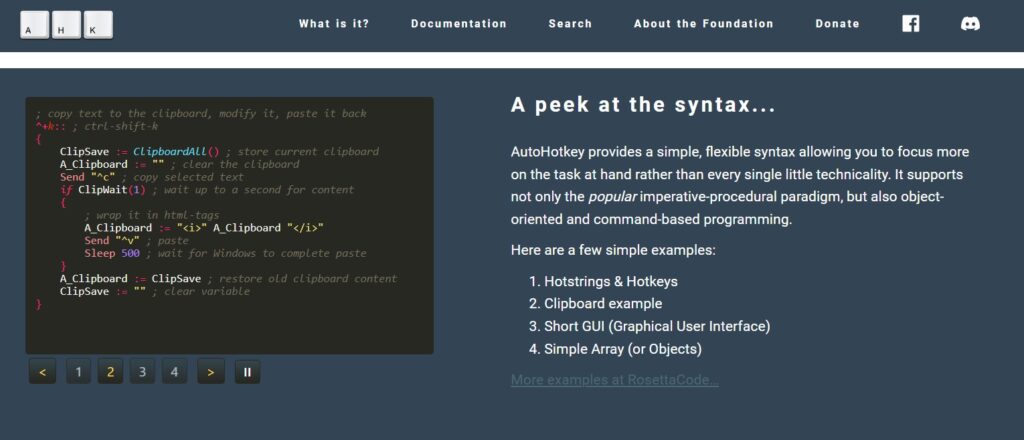
AutoHotKey is a scripting language and AI tool that helps you automate repetitive tasks. While it’s not exclusively for coding, it can help developers automate workflows and even write simple scripts for tasks like text expansion or system control.
- Main Features:
- Automates repetitive coding tasks through custom scripts.
- Provides keyboard shortcuts for executing common tasks.
- Allows you to control windows, files, and other system operations through scripts.
- Supported Languages: AutoHotKey scripting language.
- Advantages:
- Automation: AHK helps you automate repetitive tasks like code formatting, file management, or even testing workflows.
- Customization: You can write custom scripts to suit your specific needs, making it highly flexible for developers.
- Free and open-source: It’s a free, open-source tool that’s easy to install and use.
- Drawbacks:
- Limited to specific tasks: AHK is designed primarily for automation, so it’s not as versatile as some of the other AI coding tools mentioned here.
- Steep learning curve: While it’s powerful, AutoHotKey has its own syntax, and it may take some time to learn how to write effective scripts.
- Best For: Developers looking to automate repetitive tasks or build custom scripts to enhance their coding productivity.
16. ChatGPT for Code Assistance
ChatGPT, developed by OpenAI, is a versatile conversational AI that can assist developers in coding tasks. By providing explanations, code examples, and debugging assistance, it serves as a helpful companion for both beginners and experienced developers.
- Main Features:
- Engages in conversations to understand coding problems and provide tailored solutions.
- Offers code snippets and explanations across various programming languages.
- Assists with debugging and optimizing code.
- Supported Languages: Python, JavaScript, Java, C++, and more.
- Advantages:
- Interactive assistance: ChatGPT allows for interactive dialogues, making it easy to clarify coding questions and receive immediate feedback.
- Wide knowledge base: It can provide insights on a vast range of programming topics, tools, and languages.
- Learning support: Ideal for beginners who need explanations or guidance on programming concepts.
- Drawbacks:
- Not a dedicated coding tool: While useful, it lacks features like code autocompletion or integration with IDEs.
- Reliance on text: Some users may find it less efficient than tools that provide inline code suggestions.
- Best For: Developers seeking conversational assistance and explanations for coding challenges or concepts.
And the last in the list of Best Free AI Tools For Coding is-
17. Codeium
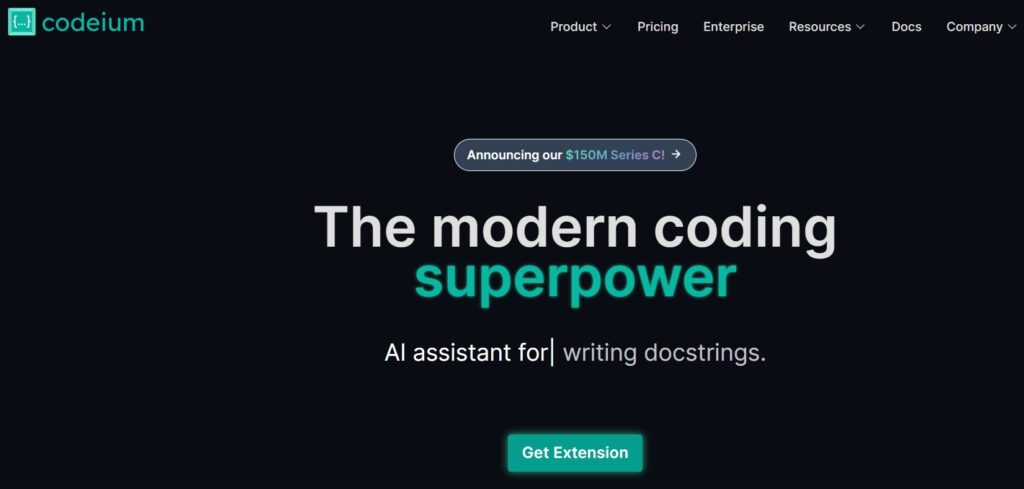
Codeium is a coding assistant that provides intelligent code suggestions and explanations directly in your code editor. It aims to streamline the coding process, making it easier for developers to write clean and efficient code.
- Main Features:
- Offers real-time code suggestions as you type.
- Provides documentation and explanations for various coding functions.
- Integrates seamlessly with popular code editors.
- Supported Languages: Python, Java, JavaScript, C#, and others.
- Advantages:
- Real-time assistance: The tool actively suggests code completions, which can speed up the development process.
- Comprehensive explanations: Helps users understand code snippets and functions, making it great for learning.
- Easy integration: Works with popular editors, ensuring a smooth coding experience.
- Drawbacks:
- Limited language support: While it covers many languages, it may not support every niche language or framework.
- Potential for over-reliance: Developers may become overly dependent on suggestions, hindering their coding skills.
- Best For: Developers looking for a supportive tool that helps improve coding speed and understanding.
Now, let’s see the Comparison of Best Free AI Tools For Coding–
Comparison of Best Free AI Tools For Coding
| S/N | Tool | Main Features | Supported Languages | Advantages |
|---|---|---|---|---|
| 1 | GitHub Copilot | Code suggestions, autocompletion, code snippets | Python, JavaScript, TypeScript, Ruby, etc. | Context-aware suggestions; integrates with GitHub. |
| 2 | Tabnine | Intelligent code completions, team training | Multiple languages | Fast autocompletions; learns from your code style. |
| 3 | OpenAI Codex | Code generation from natural language prompts | Python, JavaScript, Ruby, Go, etc. | Excellent natural language understanding; rapid prototyping. |
| 4 | CodeT5 | Code generation, code completion | Python, Java, JavaScript, C++, etc. | Pre-trained on various programming tasks; multilingual support. |
| 5 | IntelliCode by Microsoft | Contextual suggestions, team models | C#, Java, TypeScript, Python, etc. | Learns from your team’s coding style; integrates with Visual Studio. |
| 6 | DeepCode | Code reviews, bug detection | Java, JavaScript, Python, etc. | Identifies potential bugs; improves code quality. |
| 7 | CodeWhisperer by AWS | Code suggestions, example generation | Python, Java, JavaScript, C#, etc. | AWS integration; helps with cloud-based development. |
| 8 | Ponicode | Automated unit test generation | JavaScript, Python, Java, etc. | Increases test coverage; integrates with popular IDEs. |
| 9 | Sourcery | Code improvement suggestions | Python | Enhances code quality; easy integration with various editors. |
| 10 | PyCharm Code Completion | Contextual suggestions in PyCharm | Python | Seamless integration with PyCharm; powerful for Python coding. |
| 11 | Polycoder | Code generation across multiple languages | C, C++, Python, etc. | Versatile code generation capabilities; multi-language support. |
| 12 | Replit Ghostwriter | AI-powered suggestions and completions | Python, JavaScript, Ruby, etc. | Collaborative coding environment; easy to use for beginners. |
| 13 | Codiga | Code quality checks, suggestions for improvements | Python, Java, JavaScript, etc. | Helps maintain code quality; integrated into CI/CD workflows. |
| 14 | Kaggle Kernels | Online coding environment with notebooks | Python, R | Great for data science; easy sharing and collaboration. |
| 15 | AutoHotKey (AHK) | Scripting for automation tasks | AHK scripts | Simplifies repetitive tasks; customizable for various needs. |
| 16 | ChatGPT for Code Assistance | Conversational coding support, debugging advice | Python, JavaScript, Java, C++, etc. | Interactive assistance; vast knowledge base for coding queries. |
| 17 | Codeium | Real-time code suggestions, documentation access | Python, JavaScript, TypeScript, etc. | Enhances productivity with smart suggestions; easy integration. |
How to Integrate AI Tools into Your Workflow
Using AI tools can really simplify your coding journey and help you work faster. Here’s a step-by-step guide to make it easy for you to add these tools to your daily routine:
Step 1: Identify Your Needs
- Reflect on Your Work: Take a moment to think about where you could use some extra help in your coding. Here are some questions to guide you:
- Do you find yourself typing the same lines of code over and over?
- Are bugs a common headache for you?
- Is it tough to keep your documentation updated?
Step 2: Research Available Tools
- Explore Your Options: Dive into the world of AI coding tools! Look for:
- Features: What cool things can the tool do? Think about features like code suggestions or bug-finding capabilities.
- Supported Languages: Make sure the tool supports the programming languages you’re using.
- User Reviews: Check out what other developers are saying. Their experiences can help you find the best fit.
Step 3: Choose the Right Tool(s)
- Pick Your Favorites: After doing your research, choose one or two tools that really catch your interest. Don’t be afraid to try a few out to see which one feels right for you!
Step 4: Install and Configure
- Get Set Up: Follow the easy instructions to install your chosen tool. This might include:
- Downloading a plugin or extension for your coding software (IDE).
- Creating an account if needed—most are quick and simple!
- Adjusting some settings to match your coding style. Personalizing the tool can make it work better for you.
Step 5: Start with Simple Tasks
- Ease Into It: Begin using the tool for straightforward tasks. Try:
- Utilizing code completion to speed up your work.
- Asking for suggestions on variable names or function definitions.
- Experimenting with documentation features to get familiar with what the tool can do.
Step 6: Use It for Bigger Projects
- Grow Your Comfort: As you become more comfortable, start using the tool for larger coding projects. You can try:
- Writing and refining your code with its help.
- Finding and fixing bugs more efficiently.
- Keeping your documentation neat and helpful for yourself and your team.
Step 7: Monitor and Evaluate
- Check Your Progress: Regularly think about how the AI tool is affecting your work. Ask yourself:
- Are you coding faster and more efficiently?
- Are the tool’s suggestions useful and relevant?
- Are you encountering fewer errors in your code?
Step 8: Adjust and Optimize
- Make It Yours: If something doesn’t feel quite right, don’t hesitate to tweak the settings or explore new features. You might want to:
- Experiment with different ways to ask for help.
- Look for tips online or join forums where others share their experiences with the same tool.
Step 9: Share Knowledge with Your Team
- Spread the Word: If you’re part of a team, share what you’ve learned about the AI tool. Consider:
- Hosting a quick demo to show your teammates how to use it.
- Discussing your favorite features and how it can help everyone improve their workflow.
Future of AI in Coding
The future of AI in coding looks really bright and exciting! As technology keeps getting better, AI will play a bigger role in how we code. This is what you can look forward to in the coming years:
1. Smarter Code Help
- Personalized Suggestions: Imagine if AI tools could learn how you code and give you advice based on your style. In the future, you might get suggestions that fit exactly what you need, helping you code faster and with fewer mistakes.
2. Automatic Bug Fixing
- Easier Bug Fixes: AI will not only find bugs but also suggest and even apply fixes. This could save you lots of time and let you focus on creating awesome software instead of getting stuck fixing errors.
3. Better Team Collaboration
- Working Together: AI tools will help teams work better together. Picture a tool that helps everyone on your team understand the code more easily, making it simpler for new members to join in and contribute.
4. Enhanced Learning
- Smart Learning Platforms: AI will change how we learn to code. Future platforms could give you personalized lessons based on what you already know and what you want to learn. Whether you’re just starting or already experienced, you’ll find resources that suit your style.
5. Improved Code Quality
- Higher Standards: With AI checking the quality of code in real-time, we can expect better software. This means fewer security issues, improved performance, and more reliable applications for everyone.
6. Speaking Your Code
- Natural Language Coding: Imagine being able to tell your AI what you want your code to do in simple words, and it writes the code for you. As AI understands language better, this might soon be a reality!
7. Mixing with Other Technologies
- AI Everywhere: AI won’t just stick to coding; it will work with other technologies like cloud computing, smart devices, and blockchain. This will open up new ways for developers to innovate and create smart, connected systems.
8. Making Coding Accessible
- Coding for Everyone: AI will make it easier for people who aren’t tech-savvy to try coding. With user-friendly AI tools, anyone can create apps or websites, leading to a more diverse group of developers.
9. Thinking About Ethics
- Using AI Responsibly: As AI becomes a big part of coding, we need to think about how we use it. It’s important for developers to ensure that AI is used in a fair way, helping everyone and avoiding biases.
And here the list ends. I hope these Best Free AI Tools For Coding will definitely help you. I would suggest you bookmark this article for future referrals. Now it’s time to wrap up.
Conclusion
As we come to the end, it’s clear that the world of coding is changing quickly, and the Best Free AI Tools for Coding are here to help! These tools can make your coding experience smoother and help you write better code. With features like smart suggestions and automatic bug fixes, you can save time and focus more on the fun parts of coding.
Looking to the future, AI will play an even bigger role in coding. It’s super important to know about the Best Free AI Tools for Coding that can make your life easier. These tools are like having a helpful friend by your side, ready to support you through challenges and help your projects succeed.
Take a moment to explore the Best Free AI Tools for Coding that fit your style and needs. Finding the right tools can make a big difference, allowing you to unleash your creativity and build amazing things.
Remember, the journey of coding is just as exciting as what you create. With the Best Free AI Tools for Coding on your team, you’re all set to tackle any coding adventure that comes your way.
All the Best!
Enjoy Learning!
You May Also Be Interested In
Best Resources to Learn Computer Vision (YouTube, Tutorials, Courses, Books, etc.)- 2026
Best Certification Courses for Artificial Intelligence- Beginner to Advanced
Best Natural Language Processing Courses Online to Become an Expert
Best Artificial Intelligence Courses for Healthcare You Should Know in 2026
What is Natural Language Processing? A Complete and Easy Guide
Best Books for Natural Language Processing You Should Read
Augmented Reality Vs Virtual Reality, Differences You Need To Know!
What are Artificial Intelligence Examples? Real-World Examples
Thank YOU!
Explore more about Artificial Intelligence.
Though of the Day…
‘ It’s what you learn after you know it all that counts.’
– John Wooden
Written By Aqsa Zafar
Aqsa Zafar is a Ph.D. scholar in Machine Learning at Dayananda Sagar University, specializing in Natural Language Processing and Deep Learning. She has published research in AI applications for mental health and actively shares insights on data science, machine learning, and generative AI through MLTUT. With a strong background in computer science (B.Tech and M.Tech), Aqsa combines academic expertise with practical experience to help learners and professionals understand and apply AI in real-world scenarios.

